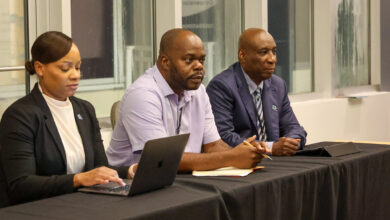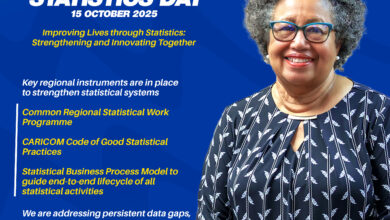The status of the Region's education sector and training are in high focus at the Eleventh Meeting of the Caribbean Community (CARICOM) Council for Human and Social Development (COHSOD), which opened in Georgetown on Thursday, 28th October 2004.
The theme of this year's two-day Meeting is Investing in Human Resources with Special Reference to Education and Training. In welcoming Ministers and other delegates to the opening of COHSOD XI, Guyana's Minister of Education, Dr Henry Jeffrey noted the Meeting's major focus on policies and strategies to improve the quality of education. He said that the COHSOD Meeting comes shortly before the start of the Fourth High-Level Group Meeting on Education for All , which is scheduled to begin in Brasilia 8th-10th November, 2004.
The Ministers and other delegates are expected to look towards the introduction of human development programmes aimed at preparing the Region's workforce to be part of the Regional and global trade in services especially in the context of the implementation of the CARICOM Single Market and Economy.
As part of its packed agenda, the COHSOD will deliberate and strategise for the introduction of new programmes in the Region's education sector to incorporate and maximise the use of Information and Communication Technologies (ICTs) in Member States. This is extremely important in order to equip the Region's human resources for global competitiveness.
As Chairman of the opening of the COHSOD Meeting, CARICOM Assistant Secretary-General for Human and Social Development, Dr Edward Greene told the Ministers and other delegates that the Meeting will serve as a basis to “resolve some critical issues that underscore the intricate linkages between social and economic policies, especially in the context of the CSME process and the role that education plays in the development of human resources required for a CSME that is competitive in the global arena.”
Dr Greene cited the collaboration among youth, health, education and labour as human and social achievements of the Region, as it seeks to improve the well-being of youth while enhancing their employment opportunities.
Outgoing Chairman of the COHSOD, Senator, the Hon. Hazel Manning, Minister of Education of Trinidad and Tobago emphasised the importance of COHSOD in setting the stage for collaboration among Member States in the sphere of education. “Our purpose at this meeting is still the same, to see how far we have come in nourishing human potential in the CARICOM Region,” said Minister Manning.
Meanwhile, Deputy Secretary General of CARICOM, Ambassador Applewhaite said the meeting is the culmination of a series of consultations on accreditation and technical and vocational education, the outcome of which formed part of the Agenda for the two-day Meeting. Citing specifically the labour market situation in the Region, and its relevance to the issues of education and training she noted, “If the CSME is to be meaningful, regional and national accreditation bodies must be institutionalized.”
Touching on the issue of the migration of teachers and nurses, the Deputy Secretary-General stressed that, “Caribbean markets need to adjust to new demands and to high levels of migration of skilled workers.” This, she said would entail the reforming of the Region's education system, which “must take into account the pressing characteristics of a knowledge-based economy and produce a new type of worker.”
At the Opening Ceremony, the United Nations Children's Fund (UNICEF) signed a Memorandum of Understanding (MOU) with the CARICOM Secretariat for increased collaboration between the organizations. Over the years, UNICEF has been instrumental in helping to shape the policies relating to child welfare and more recently, the international organisation has been supportive of the Region's fight against HIV/AIDS.





